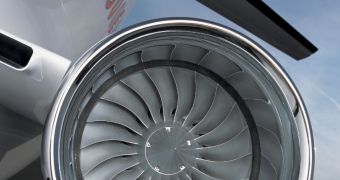A newly created metal alloy promises to improve the overall efficiency and to reduce fabrication waste in jet engine components, by greatly reducing the uncertainty of thermocouple temperature sensors at high temperatures to within a degree.
Created by scientists at the National Physical Laboratory, the alloy could soon find practical applications in the aviation industry, where it could help create more efficient jet engines and lower aircraft emissions.
Thermocouples are a widely used type of temperature sensors and can also be used as a means to convert thermal potential difference into electric potential difference, but its main problem is precision and system errors of less than 1 ?C have so far proven extremely difficult to achieve.
They are calibrated using materials with previously known melting points, but the reference materials currently available for the region of the very high temperatures required to treat jet engine components have a large uncertainty compared with the lower temperature fixed points.
Using this new type of metal alloy, researchers at the NPL have now identified a range of reference points for thermocouples beyond 1100 ?C. This leads to greatly increased degrees of confidence in thermal sensors, which components manufacturers hope to use in order to improve hotter thermal treatments and reducing wastage during production of parts for engines which can run at higher temperatures.
This could be extremely useful, as aircraft engines are more efficient at higher temperatures, but so far required thermal treatment of engine components at very specific high temperatures in excess of 1300 ?C, which could produce negative effects if the treatment temperature is only slightly above or below the optimal temperature.
The new applications of this superalloy coating have the key advantages of giving the jet engines better performance and a longer life, as well as reducing losses in the fabrication process.

 14 DAY TRIAL //
14 DAY TRIAL //